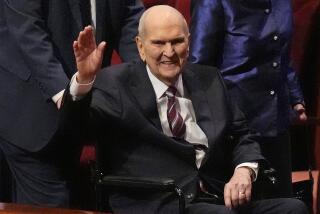Q&A;: A brief primer about Mormon beliefs
- Share via
Mitt Romney is the first major-party nominee for president who is a member of the Church of Jesus Christ of Latter-day Saints — the Mormons. Here is a brief primer about Mormon history and beliefs:
Who are the Mormons?
The LDS Church claims some 14 million members, more than half outside the United States. Most American Mormons live in the West, with more than a third concentrated in Utah. American Mormons are overwhelmingly white (88%) and Republican-leaning (74%), according to the independent Pew Forum on Religion and Public Life.
What are the origins of the church?
In 1820, according to LDS teaching, 14-year-old Joseph Smith had a vision of God and Jesus near his home in upstate New York. Seven years later, he was given golden plates by an angel, Moroni. His translation of the plates would become the Book of Mormon, which Mormons regard as scripture alongside the Bible. It describes how ancient Israelites sailed to America in about 600 B.C., and how their descendants, the Nephites, were visited by Jesus Christ after his resurrection. According to Smith, once he completed his translation, the golden plates were retrieved by the angel Moroni, whose statue tops most Mormon temples.
How did the Mormons wind up in Utah?
Smith formally founded the church on April 6, 1830, near Palmyra, N.Y. But in their early years, the Mormons suffered rejection and, at times, violent persecution. Church members moved to Ohio, Missouri and Illinois, where Smith was killed in 1844 by an angry mob. Most Mormons then chose to follow Brigham Young, who led them to Utah in 1847.
What do they believe?
Mormons consider themselves Christian, although many Christian denominations disagree. While most Christians believe that Jesus, God and the Holy Spirit form a single, unified trinity, Mormons believe that they are three separate individuals. Mormons also believe that humans had a “premortal life” — in essence, that each soul has existed forever — and that families can be “sealed” together for eternity. This last belief has contributed to the sometimes controversial practice of baptizing the dead “by proxy.”
Are Mormons polygamous?
Not anymore. Mormons officially condoned “plural marriage” for slightly less than half a century after the founding of the church. Under pressure from U.S. authorities, the church banned the practice in 1890. Splinter groups have kept it alive in a small way, but they have no standing in the LDS church and are officially frowned upon.
Who runs the Mormon Church?
Fifteen men are designated as apostles and are believed to receive revelation directly from Jesus. The most senior of them is the prophet and president of the church, a post currently held by 85-year-old Thomas Monson. Regional organizations, known as stakes, are led by presidents; individual congregations, or wards, are led by bishops. (Romney served as both a bishop and a stake president in Massachusetts.) There is no full-time clergy; the Mormon priesthood is a lay institution.
What is the status of women?
Women are barred from the priesthood and most senior leadership positions, although they participate actively in congregational life. Mormon tradition strongly encourages women to be homemakers, although a Mormon feminist movement has been active in recent years and more Mormon women are pursuing professional careers.
What is the church’s position on abortion and same-sex marriage?
It opposes both, although it allows abortion in some cases. The church played a key role in supporting Proposition 8, the California initiative that banned same-sex marriage (and was later overturned in court).
Who are those two guys in white shirts and ties?
The LDS Church has a strong missionary component, and many Mormons (including Romney) have served as missionaries, generally working in pairs. The church says it has 52,000 missionaries, including young women and retired couples, in 350 missions around the world.
Other distinct Mormon traits?
Mormon doctrine encourages the faithful to keep at least a three-month supply of food on hand, and many do. Mormon dietary rules forbid the consumption of alcohol, coffee, tea or tobacco. There would be no “beer summit” in a Romney presidency.
mitchell.landsberg@latimes.com
More to Read
Sign up for Essential California
The most important California stories and recommendations in your inbox every morning.
You may occasionally receive promotional content from the Los Angeles Times.










